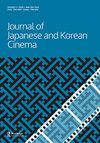Gwangju and the 1980s film movement: the representation of the minjung in Oh! My Dream Country
引用次数: 0
Abstract
ABSTRACT This article explores early cinematic representations of the Gwangju Uprising in the films The Announcement of Mr. Kant (1987, Kim Tae-yeong), Hwangmuji (1988, Kim Tae-yeong), and Oh! My Dream Country (1989, Jangsan-gotmae), with particular attention paid to the final film. These three 16 mm fiction works are all ‘independent films’ made within the context of the emancipator activism of the minjung movement in the 1980s South Korea. This study demonstrates how these three films can be categorized as so called ‘minjung films’ that refer to the ‘independent’ works devoted to the ‘independence’ of the people from the authoritarian South Korean state and the political interference of the United States. I also analyse how Oh! My Dream Country is particularly representative of minjung cinema when considering the collaborative mode in which it was produced and its treatment of the Gwangju Uprising as a pro-democracy struggle. Finally, through a textual analysis of Oh! My Dream Country, I reassess the historical significances of these three early Gwangju films through the lens of gender. I discuss how the minjung, particularly in Gwangju, were problematically feminized as collective victims in the 1980s by the discourse of anti-American nationalism, which was primarily constructed by male intellectuals.光州与20世纪80年代的电影运动——《哦!》我的梦想国度
摘要本文探讨了电影《康德先生的宣告》(1987,金)、《黄慕姬》(1988,金)和《噢!《我的梦之国》(1989年,后前章三),特别关注最后一部电影。这三个16 mm的小说作品都是在20世纪80年代韩国民荣运动的解放运动背景下拍摄的“独立电影”。这项研究表明,这三部电影可以被归类为所谓的“民荣电影”,指的是致力于人民从专制的韩国国家和美国政治干预中“独立”的“独立”作品。我还分析了如何哦!考虑到《我的梦之国》的合作制作模式,以及它将光州起义视为一场民主斗争的处理方式,《我的梦想之国》尤其具有民荣电影的代表性。最后,通过对《哦!在《我的梦之国》中,我通过性别的视角重新评估了这三部早期光州电影的历史意义。我讨论了在20世纪80年代,主要由男性知识分子构建的反美民族主义话语中,民荣,特别是光州的民荣,是如何被女性化为集体受害者的。
本文章由计算机程序翻译,如有差异,请以英文原文为准。
求助全文
约1分钟内获得全文
求助全文
来源期刊

Journal of Japanese and Korean Cinema
Arts and Humanities-Visual Arts and Performing Arts
CiteScore
0.60
自引率
0.00%
发文量
16
期刊介绍:
Journal of Japanese and Korean Cinema is a fully refereed forum for the dissemination of scholarly work devoted to the cinemas of Japan and Korea and the interactions and relations between them. The increasingly transnational status of Japanese and Korean cinema underlines the need to deepen our understanding of this ever more globalized film-making region. Journal of Japanese and Korean Cinema is a peer-reviewed journal. The peer review process is double blind. Detailed Instructions for Authors can be found here.
 求助内容:
求助内容: 应助结果提醒方式:
应助结果提醒方式:


